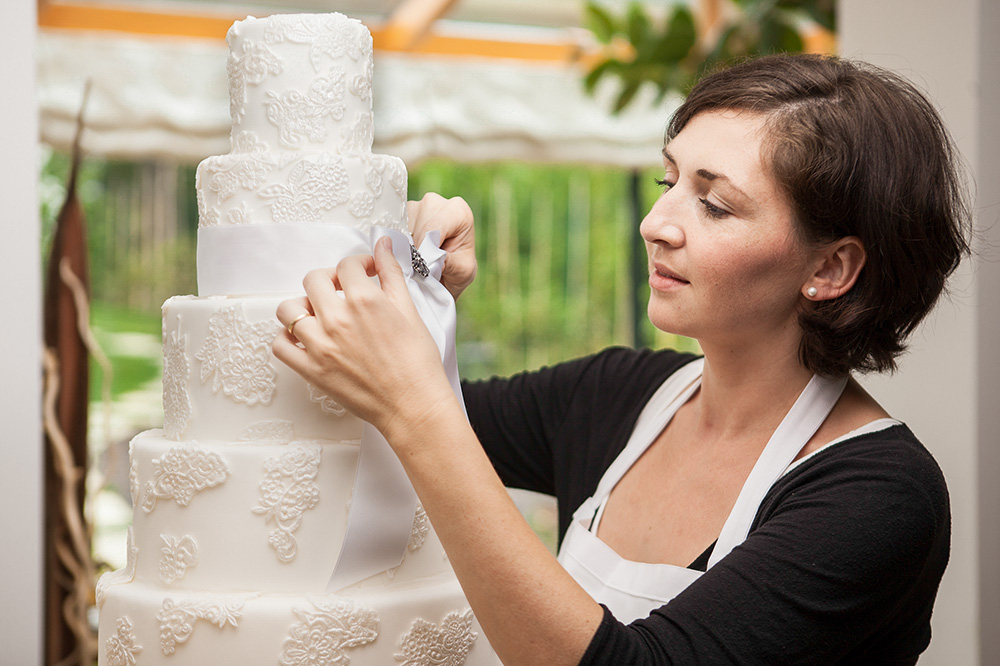From educator to cultural manager to one of Austria’s best-known and most highly regarded cake designers. Christina Krug exemplifies the courage to change—and has done so with the greatest possible success.

Christina Krug creates the most beautiful designer cakes, and her little café—which she calls “Schnabulerie”—is a lovingly designed oasis of peace and relaxation. This highly motivated master confectioner has truly found her calling and is now living her own very personal dream. But building up her own business and leaving everything familiar behind demanded a great deal of strength and effort from the Lower Austria native. “Quitting my job in cultural education, for which I’d spent many years studying, to enter an industry where I’d have to start all over again from scratch and hadn’t even learned the necessary skills was something that did indeed scare me.” The trained pianist didn’t allow her fear to become an obstacle, though. “Over the entire period I spent studying instrumental education for piano, I had to deal with a lot of stage fright. It accompanied me constantly—thanks to which I ended up learning how to handle it. One can think of that, too, as training of sorts.”
The ability to deal with fear is one of many things that she took with her from her studies. “As a musician, you’re actually giving yourself ideal preparation to become an entrepreneur: the unbelievable consistency that you learn to exhibit through hours upon hours of practicing and the tenacity you need to do something like practice a sonata long enough for it to be 100% assured are, I think, the two most important things you need in order to be successful as a businessperson.” The ability to be consistent is something she certainly did demonstrate during her piano studies when it became clear to her that she was actually gravitating towards cultural management. She finished her degree even so, thereafter beginning right away with the mdw’s Cultural Management programme. At the same time, she took a cultural education job with the Tonkünstler Orchestra. Her two programmes of study ended up getting her where she is today, because a lot of what she learned during her training back then is indeed useful to her now. “I run my business like a cultural institution. For one thing, I’d already learned how important it is to have a corporate identity.” So even while developing her business plan, the budding pastry chef was already thinking about her product line and the market segment that she wanted to occupy. “I realised that I’d be able to satisfy my artistic bent with custom-designed cakes, particularly wedding cakes. And that’s a market where people actually are willing to spend real money. Which is an important point, because when you’re practicing a craft at the highest possible level, you need to be doing so for occasions that people deem worth spending a sufficient amount of money on.” By attending numerous courses all over the world, Christina Krug keeps abreast of everything there is to know about the latest decorating techniques—some of which take their cue from other fields such as fashion and interior design. “It really is about art, here. Artisanship alone isn’t enough.” Dealing with artistic aesthetics as a concept unto itself had already interested her during her cultural management studies—and to this day, it hasn’t let her go. “Art is something that arts universities teach very well; but in the trades, it was long the case that there was zero interest in learning about it. That’s changing, though.” Christina Krug says that social media platforms like Instagram and Pinterest are playing a major role in this. “Everywhere these days, you hit upon pictures of ingenious cakes from England and America. People see those and want to have something similar. But off the top of my head, I can think of only five people doing this in Austria—so it’s an unbelievable gap in the market!”
The ability to derive artistic self-fulfilment from her creations is something that the young cake designer prizes quite highly. “You have an idea and then think about how it could be realised. That’s honest work, and you’re giving people something that makes them happy.” Which turns up some parallels to her former job with the Tonkünstler Orchestra. “I could imagine going back to cultural management at some point, but not as an employee. Because if I’m going to work that much, then it has to be for myself.” The fact that self-employment doesn’t only have advantages is obvious: hard work, self-responsibility, and sleepless nights are familiar companions to this young businessperson—even if the sleepless nights are growing rarer. “You gradually become calmer. When I feel afraid, I try to ignore it and focus on the objective at hand.” And besides, fear also has its positive side: “If I hadn’t had a respectful fear of what I was doing, my bank and the Business Angels [a service for business founders offered by the Austrian Federal Economic Chamber—Trans.] would’ve thought I was being reckless. So my tendency to take that seriously helped me find people who ended up supporting me in what I’d set out to do.”
Does she still play the piano now and again? “Yes, I’m back to playing quite a bit. And what I’ve learned is this: you don’t always have to pick out the most difficult pieces to get a maximum of pleasure out of piano-playing.”

